Full Body MRI Scan In Australia
Discover how Everlab's state of the art full body MRI scan in Australia can offer comprehensive insights into your health, helping you detect potential issues before they become serious. Whether you’re in Melbourne, Brisbane or Sydney, this non-invasive test gives you the peace of mind you need. Take charge of your health by booking your Full Body MRI Scan today and start your journey to better well-being.
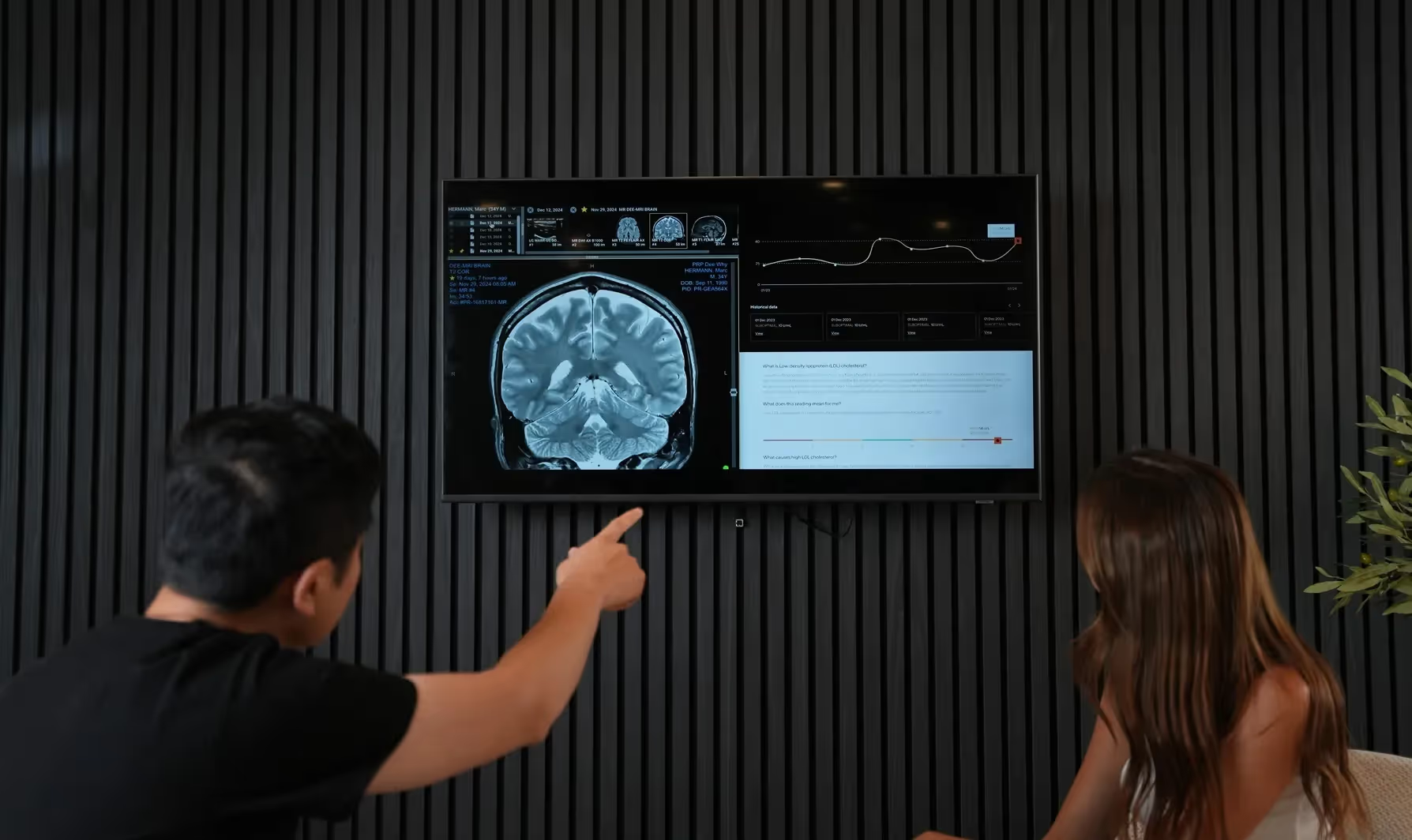
Full Body MRI Scan In Australia, Book Your Full Body Scan Today
What:
Full body scan
Tests for:
Cancers, cardiovascular diseases, and neurological disorders
Referral:
Yes
Member cost:
$3,499
Overview: Full Body MRI
A Full Body MRI, often referred to as a body scan, is a powerful tool in preventive health, providing a comprehensive health screening option that allows you to detect potential health risks before they become serious. This detailed imaging scan examines your entire body from brain to pelvis for signs of abnormalities, such as cancers, cardiovascular diseases, and neurological disorders. By offering a non-invasive and radiation-free method, Full Body MRIs provide a safer way to assess your overall health.
What is a Full Body MRI?
A Full Body MRI is a comprehensive diagnostic scan that captures detailed images of your organs, tissues, and bones using magnetic resonance imaging (MRI). It is particularly useful for diagnosing and monitoring a variety of medical conditions, including injuries, tumors, and infections. Unlike other imaging techniques like X-rays or CT scans, MRIs don’t expose you to radiation. The MRI scanner ensures patient safety and comfort by not involving harmful radiation, but it is crucial to notify staff about any metal implants due to the powerful magnetic fields. The scan covers your entire body, from your brain to your pelvis, detecting early signs of health issues such as tumours, cardiovascular disease, and neurological disorders.
How does an MRI Work?
MMRI, or magnetic resonance imaging works by generating a strong magnetic field, which aligns the protons in your body’s water molecules. Radio waves then disrupt this alignment. When the waves are turned off, the protons realign with the magnetic field, emitting signals that create detailed images of your body’s internal structures. This method allows for precise detection of abnormalities in soft tissues, including muscles, blood vessels, and organs. While MRI is a powerful tool, it is often used in conjunction with other diagnostic tests to provide a comprehensive assessment of a patient's health.
MRIs offer clearer images of soft tissues compared to X-rays and CT scans, making them the preferred option for detecting issues in areas such as the brain, muscles, and internal organs.
What is the difference between an MRI, X-ray, and CT?
MRIs, X-rays, and CT scans are all diagnostic tools, but they differ significantly in how they work and what they detect.
- MRIs use magnetic fields and radio waves to produce detailed images of soft tissues without exposing you to x-ray radiation.
- X-rays and CT scans use ionising radiation and are better suited for imaging hard structures like bones. CT scans combine multiple X-rays to create cross-sectional views, while MRIs excel in imaging soft tissues, making them ideal for diagnosing issues in the brain and internal organs.
- To identify cardiovascular diseases, such as atherosclerosis, a CTCA test can be used to assess artery blockages.
MRIs stand out due to their ability to provide detailed, radiation-free imaging, making them a preferred choice for preventive health scans like the Full Body MRI. It is important to note that while MRIs provide detailed images, they are often used alongside other diagnostic tests to ensure a complete health evaluation.

Why are MRIs conducted?
MRIs are used to diagnose or monitor various conditions. They are often conducted to:
- Detect cancerous tumours or abnormalities in the brain, heart, liver, and other organs.
- Monitor neurological conditions like multiple sclerosis.
- Evaluate musculoskeletal problems, such as joint or spine issues.
In preventive health, Full Body MRIs help detect potential issues early, even before symptoms appear, allowing for timely intervention and better health outcomes. Whole body MRIs are particularly beneficial for providing a comprehensive overview of your health, detecting potential issues across various organs and systems.
What are Full Body MRIs designed to show me?
A Full Body MRI provides a detailed look at your internal health. It covers all major organs, including the brain, lungs, liver, kidneys, and bones. This scan can reveal early signs of conditions like inflammation, tumours, vascular diseases, and degenerative conditions.
While the benefits of a Full Body MRI are extensive, it is important to consider that patients may need to pay out of pocket for this comprehensive scan, depending on their healthcare coverage.
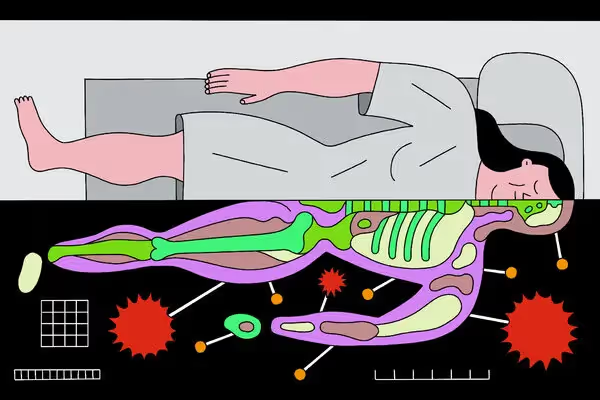
Benefits and uses of Full Body MRI Scans
Full Body MRI scans offer a multitude of benefits, making them an invaluable tool in preventive medicine. Here are some of the key advantages of undergoing a Full Body MRI scan:
- Early Detection of Cancer: One of the most significant benefits of a Full Body MRI scan is its ability to detect cancer at an early stage, often before symptoms appear. This early detection is crucial for timely treatment and significantly improves the chances of successful outcomes.
- Comprehensive Health Check: A Full Body MRI scan provides a thorough overview of your internal organs and tissues. This comprehensive assessment can identify various health conditions, including heart disease, thyroid cancer, and other clinically significant diseases, allowing for early intervention.
- No Radiation Exposure: Unlike PET scans, Full Body MRI scans do not use ionising radiation. This makes them a safer option for patients, particularly those who require frequent imaging or have concerns about radiation exposure.
- Detailed Pictures: MRI machines create detailed pictures of the body’s internal structures. These high-resolution images enable accurate diagnosis and effective treatment planning, ensuring that any detected issues are addressed promptly.
- Family History: Individuals with a family history of cancer or other diseases can greatly benefit from a Full Body MRI scan. By detecting potential health issues early, these scans provide peace of mind and a proactive approach to health management.
- No MRI Contrast Required: Unlike some MRI scans that require the use of contrast agents, Full Body MRI scans often do not need MRI contrast. This makes the procedure more comfortable for patients, especially those who may have allergies or sensitivities to contrast materials.
- Preventive Medicine: Full Body MRI scans are a cornerstone of preventive medicine. They empower individuals to take proactive steps towards maintaining their health by detecting potential issues early and allowing for timely intervention.
Some specific uses of Full Body MRI scans include:
- Cancer Screening: Full Body MRI scans are effective for screening various types of cancer, including breast cancer, lung cancer, and colon cancer. By identifying tumors at an early stage, these scans facilitate prompt treatment and better outcomes.
- Thyroid Cancer Detection: Full Body MRI scans can identify thyroid cancer and other thyroid conditions. Early detection of thyroid abnormalities enables early treatment, improving the chances of successful management.
- Abnormal Findings: Full Body MRI scans can reveal abnormal findings such as tumors, cysts, and other lesions. Detecting these abnormalities early allows for further evaluation and appropriate treatment, ensuring better health outcomes.
Getting a full Body MRI
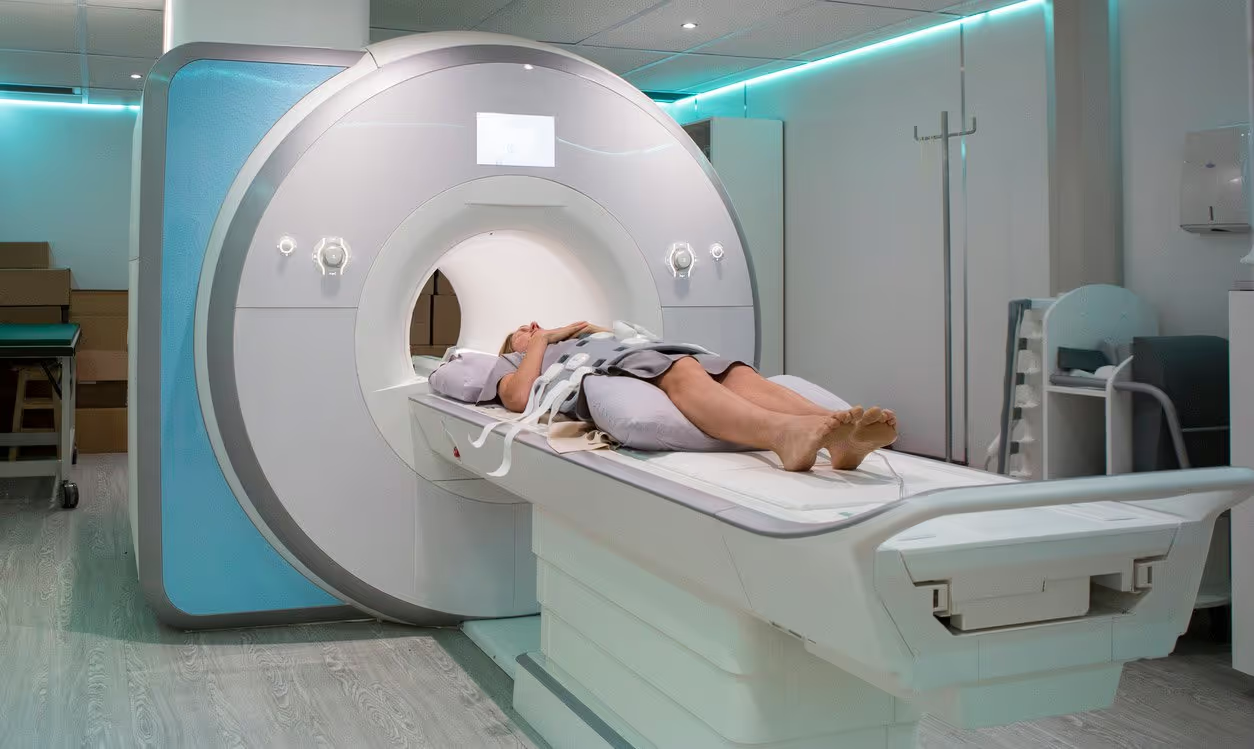
Can I get It done at Everlab?
Yes, Everlab offers Full Body MRI scans throughout Australia. Our team will organise your full body mri scan for you as soon as a booking becomes available. Please sign up below to learn more.
How should I prepare for a Full Body MRI?
Preparing for a Full Body MRI is simple. The MRI scanner uses powerful magnetic fields, so you’ll need to remove any metal objects, such as jewellery or watches, to avoid interference. Depending on the area being scanned, fasting for a few hours might be necessary. Wear comfortable clothes, and be prepared to lie still during the scan to ensure clear images.
What’s the process for getting a Full Body MRI?
At Everlab, scheduling a Full Body MRI is straightforward. After booking your appointment, we’ll guide you through the preparation steps, such as removing any metal objects and following any fasting requirements. On the day of the scan, our team will ensure you’re comfortable and informed throughout the procedure. After your scan, we’ll review the images, provide a detailed report with any findings and go through any findings in your next consultation.
Your Results
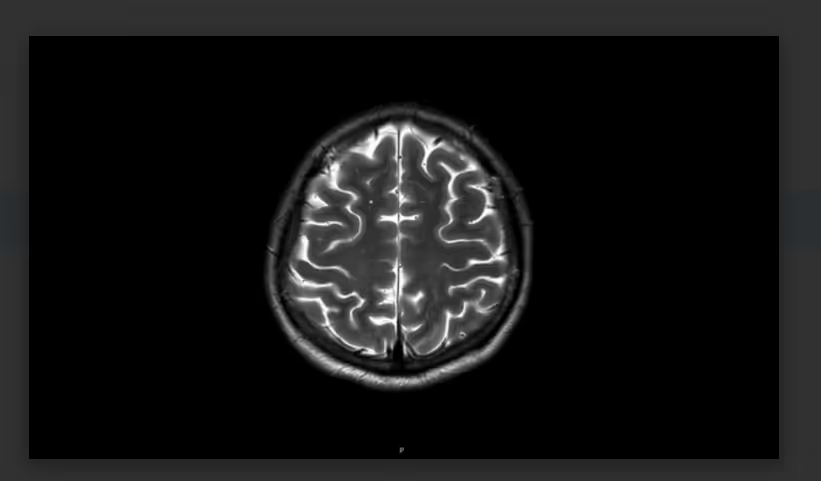
What results are there?
A Full Body MRI will generate detailed images that our experts will review to identify any signs of abnormalities. You’ll receive a full report that highlights any areas of concern, such as tumours or inflammation. If any issues are detected, we’ll guide you through the next steps for further investigation or treatment.
How do I interpret my results?
Interpreting MRI results requires expertise, which is why our team at Everlab will walk you through your report. We’ll explain each finding and its significance, helping you understand your overall health and what actions you can take to improve it.
Results can be difficult to understand.
What do the results mean?
Your MRI results offer a clear picture of your internal health. Whether the scan reveals potential risks or confirms that everything is functioning well, the information will help you make informed decisions about your lifestyle and preventive health measures.
What do I need to do after my test?
After your Full Body MRI, it’s important to review your results with a healthcare professional. At Everlab, we’ll help you understand your findings and create a personalised plan to address any issues or maintain your current health. Whether further testing is needed or it’s time for a routine follow-up, we’ll guide you through the process.
What Else Do I Need to Understand?
Are there any MRI side effects?
MRIs are generally safe, with minimal risks. Some people may experience mild discomfort from lying still for an extended period or feelings of claustrophobia inside the machine. However, there are no lasting side effects since MRIs do not use ionising radiation. Additionally, MRI imaging does not involve exposure to x-ray radiation, making it a safer option compared to other imaging techniques. It’s important to inform your technician if you have any metal implants or devices, such as a pacemaker, which could interfere with the scan.
How long does an MRI take?
A Full Body MRI typically takes between 30 and 90 minutes, depending on the areas being scanned. The time can vary based on the complexity of the scan and whether additional images are needed. After the scan, you can return to your normal activities immediately unless your doctor provides other instructions.
How much does it cost?
Generally, the cost ranges between $3,000 - $4,000. Prices may be higher if it's a private scan done for preventive health rather than for a specific medical reason. If the MRI is prescribed for a medical condition and covered by Medicare, a portion or the entirety of the cost may be subsidised.
Sources
- National Health Service (NHS)
MRI Scan Overview
https://www.nhs.uk/conditions/mri-scan/ - National Institute of Biomedical Imaging and Bioengineering (NIBIB)
Magnetic Resonance Imaging (MRI): How it works and what it shows
https://www.nibib.nih.gov/science-education/science-topics/magnetic-resonance-imaging-mri - Cleveland Clinic
CT Scan vs. MRI: What’s the Difference?
https://health.clevelandclinic.org/ct-scan-vs-mri - Canstar
How Much Does an MRI Cost in Australia?
https://www.canstar.com.au/health-insurance/mri-scan-cost/ - Healthdirect – What is an MRI?
Simple explanation of MRI benefits, risks, and what to expect.
https://www.healthdirect.gov.au/magnetic-resonance-imaging-mri
Full Body MRI and Cancer
A Full Body MRI is highly effective at detecting early signs of cancer, particularly in soft tissues where other imaging methods might miss abnormalities. The detailed images produced by the scan can reveal tumours or irregular growths at an early stage, often before symptoms appear. This early detection is critical for prompt treatment and improving long-term outcomes. At Everlab, we utilise Full Body MRI as a preventive tool to help catch these potential issues as early as possible.
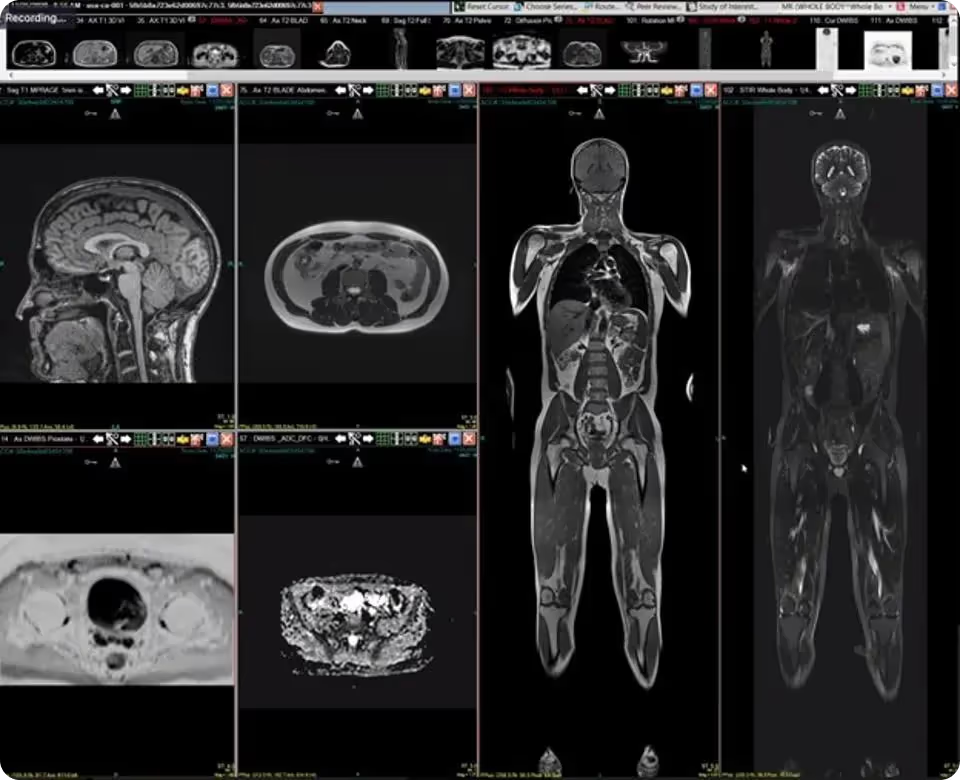
Additional FAQs


imaging

biomarkers

sterols
Book a Free Discovery Call
Join 20,000+ Australians improving their health with proactive, personalised healthcare.